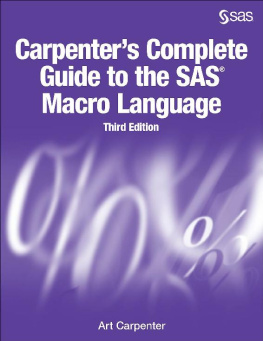Daniel Carpenter - The Forging of Bureaucratic Autonomy
Here you can read online Daniel Carpenter - The Forging of Bureaucratic Autonomy full text of the book (entire story) in english for free. Download pdf and epub, get meaning, cover and reviews about this ebook. year: 2020, publisher: Princeton University Press, genre: Politics. Description of the work, (preface) as well as reviews are available. Best literature library LitArk.com created for fans of good reading and offers a wide selection of genres:
Romance novel
Science fiction
Adventure
Detective
Science
History
Home and family
Prose
Art
Politics
Computer
Non-fiction
Religion
Business
Children
Humor
Choose a favorite category and find really read worthwhile books. Enjoy immersion in the world of imagination, feel the emotions of the characters or learn something new for yourself, make an fascinating discovery.
- Book:The Forging of Bureaucratic Autonomy
- Author:
- Publisher:Princeton University Press
- Genre:
- Year:2020
- Rating:4 / 5
- Favourites:Add to favourites
- Your mark:
- 80
- 1
- 2
- 3
- 4
- 5
The Forging of Bureaucratic Autonomy: summary, description and annotation
We offer to read an annotation, description, summary or preface (depends on what the author of the book "The Forging of Bureaucratic Autonomy" wrote himself). If you haven't found the necessary information about the book — write in the comments, we will try to find it.
The Forging of Bureaucratic Autonomy — read online for free the complete book (whole text) full work
Below is the text of the book, divided by pages. System saving the place of the last page read, allows you to conveniently read the book "The Forging of Bureaucratic Autonomy" online for free, without having to search again every time where you left off. Put a bookmark, and you can go to the page where you finished reading at any time.
Font size:
Interval:
Bookmark:

THE FORGING OF BUREAUCRATIC AUTONOMY
PRINCETON STUDIES IN AMERICAN POLITICS:
HISTORICAL, INTERNATIONAL, AND COMPARATIVE PERSPECTIVES
SERIES EDITORS
IRA KATZNELSON, MARTIN SHEFTER, THEDA SKOCPOL
A list of titles in this series appears
at the end of the book
THE FORGING OF
BUREAUCRATIC AUTONOMY
REPUTATIONS, NETWORKS, AND
POLICY INNOVATION IN
EXECUTIVE AGENCIES, 1862 1928
Daniel P. Carpenter
PRINCETON UNIVERSITY PRESS PRINCETON AND OXFORD
Copyright 2001 by Princeton University Press
Published by Princeton University Press, 41 William Street,
Princeton, New Jersey 08540
In the United Kingdom: Princeton University Press, 3 Market Place,
Woodstock, Oxfordshire OX20 1SY
All Rights Reserved
Library of Congress Cataloging-in-Publication Data
Carpenter, Daniel P., 1967
The forging of bureaucratic autonomy : reputations, networks, and policy
innovation in executive agencies, 18621928 / Daniel P. Carpenter.
p. cm. (Princeton studies in American politics)
Includes bibliographical references and index.
ISBN 0-691-07009-1 (alk. paper) ISBN 0-691-07010-5 (pbk. : alk. paper)
eISBN 978-0-691-21407-8
1. Executive departmentsUnited StatesHistory. 2. United States.
CongressHistory. 3. BureaucracyUnited StatesHistory.
4. Government executivesUnited StatesHistory. 5. Political
planningUnited StatesHistory. I. Title. II. Series.
JK585 .C37 2001
351.7309034dc21 2001036260
British Library Cataloging-in-Publication Data is available
www.pup.princeton.edu
To Kathleen Ellen Carpenter and John Edward Carpenter
THIS BOOK began as a political science dissertation at the University of Chicago. There were moments (some of them extended) when I thought the project would be infeasible or worthless, but the people I thank here made valuable contributions toward its completion. Often the very severity of their criticism convinced me of the inherent significance of the project. More often it was their support and friendship that made the countless hours of theorizing, of archiving, of running statistical analyses, and of writing seem worthwhile.
In this respect I particularly thank my dissertation committee, including Bernard Silberman and Andrew Abbott. I was helped immensely by John Mark Hansen, who shared his vast knowledge of agricultural history and politics, his long study of interest groups, of Congress, and of the bureaucracy, and, not least, his warm friendship. My dissertation chair, John F. Padgett, has been an inspiration. When the ideas here were inchoate, John provided structure, guidance, and support. He also taught me that the best social science lies neither in narrative methods nor in quantitative research alone, but in a theoretically informed combination of the two.
This book is large in scale and scopemy research effort included the collection or perusal of more than fifty thousand primary source documents from federal, state, and private archives; five thousand federal personnel files; hundreds of executive and congressional prints; and many secondary sources. I thank William Bassman and Victoria Gross of the National Personnel Records Center; Frank Scheer of the Railway Mail Service Library; Aloha South and Richard Fusick of the National Archives; Douglas Bowers, Wayne Rasmussen, and Vivian Wiser of the United States Department of Agriculture; Megaera Ausman and Jim Meyer of the United States Postal Service; Timothy Carr of the National Postal Museum; and numerous specialists in state and local archives. For data I thank Sarah Binder, Elizabeth Sanders, and the Interuniversity Consortium for Political and Social Research. Todd Austin, Sharon Barrios, Sanford Gordon, and Michael Morley provided excellent research assistance.
The Department of Politics at Princeton University was a supportive and stimulating place to begin this book. Doug Arnold, Larry Bartels, Sheri Berman, John DiIulio, Jameson Doig, Mark Fey, Fred Greenstein, Jeffrey Lewis, Tali Mendelberg, Tom Romer, Howard Rosenthal, Kenneth Schultz, and Keith Whittington offered helpful comments. At the Governmental Studies Program at the Brookings Institution, Sarah Binder, Carrie Hennefeld, Robert Katzmann, Jon Oberlander, R. Kent Weaver, and Margaret Weir shared their collegiality and insightful remarks. For financial support I thank the Alfred D. Chandler Dissertation Fellowship from Harvard Business School, the Iowa State Historical Society, the Princeton University Committee on Research in the Humanities and the Social Sciences, Princetons Center for Domestic and Comparative Policy Studies, and the University of Michigans Julia Lockwood Award.
The Department of Political Science at the University of Michigan has been a wonderful place to complete the book. Nancy Burns, John Campbell, Michael Cohen, Martha Feldman, Rick Hall, Donald Kinder, Ken Kollman, and Ann Chih Lin have provided critical and appreciative commentary.
I am also privileged to have received incisive feedback from the diverse network of scholars that comprises contemporary political science. I thank R. Michael Alvarez, Jeffrey Banks, Jonathan Bendor, William Bianco, Carles Boix, Delia Boylan, David Brady, John Brehm, Charles Cameron, Michael Dawson, Kevin Esterling, Tom Hammond, Jonathan Katz, J. Morgan Kousser, Keith Krehbiel, David Lazer, John Londregan, David Mayhew, Lawrence Rothenberg, William Sewell Jr., Stephen Skowronek, and Barry Weingast.
Ken Meier and Alice OConnor provided excellent comments on my study of the Reclamation Service, and Sidney Fine, Sam Kernell, David Mayhew, Michael McDonald, and Sunita Parikh provided helpful criticisms of my Post Office study. Daniel Kryder, Debra Reid, and Mary Summers offered critical reactions to my work on the USDA. Two historiansRichard John and Donald Pisanioffered enthusiastic and voluminous commentary, and both saved me from numerous errors. Richard Bensel, Ira Katznelson, Elizabeth Sanders, Martin Shefter, and Theda Skocpol provided helpful encouragement and advice throughout. At Princeton, Malcolm Litchfield encouraged a timely and sound submission, and Chuck Myers offered his flexible and gentle style in getting the book in print. Dalia Geffens fair and meticulous copyediting smoothed the text and excised many mistakes. The flaws that remain are mine alone.
Gerald Maras college guidance gave me reason to believe that an academic career in political science could incorporate my diverse interests. And numerous friends have smoothed this effort, among them Chris, Dan, Greg, Harry, Jeff, Peter, and Richard of the Sunday Gang, Timothy Chafos, Ann Davies, David Hooper, Chris Jordan, Steven Laymon, Gia Pascarelli, David Savio, and Chris Yannelli.
I finally thank those friends and family who complete my life, including John Breslin, S.J., Mark Gammons, and John McCormick. My sister Rebecca Carpenter has been a constant source of support and humor. My wife, Rita Butzer-Carpenter, lived this project and infused it with her love, from our dating days in graduate school to our wonderful marriage now. And, of course, none of my travails would have been possible (or worthwhile) were it not for the support of my parents, Kathleen Ellen Carpenter and John Edward Carpenter, to whom this book is dedicated.
Font size:
Interval:
Bookmark:
Similar books «The Forging of Bureaucratic Autonomy»
Look at similar books to The Forging of Bureaucratic Autonomy. We have selected literature similar in name and meaning in the hope of providing readers with more options to find new, interesting, not yet read works.
Discussion, reviews of the book The Forging of Bureaucratic Autonomy and just readers' own opinions. Leave your comments, write what you think about the work, its meaning or the main characters. Specify what exactly you liked and what you didn't like, and why you think so.













